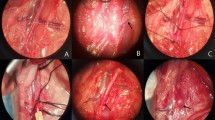Abstract
The objective of this study was to trigger the formation of rat abdominal aortic aneurysm by applying calcium chloride periarterially and then to detect the degree of prevention of aneurysm occurrence by oral introduction of indomethacin in some of the rats. Thirty-one rats were divided into three groups. The infrarenal aorta above the iliac bifurcation of rats was treated with sodium chloride in group 1 (control, n = 7), calcium chloride in group 2 (n = 12), and calcium chloride-indomethacin in group 3 (n = 12) periarterially. The rats of each group were randomly selected at the end of the first, second, and third weeks postoperatively; and vessel diameters of abdominal aortas were measured by digital photography using a micrometer. Aneurysmal development was not observed in any of the rats in the control group. None of the comparisons was statistically significant (p > 0.05). Aneurysmal development was observed in all of the rats in the calcium chloride group. Results from the first, second, and third weeks postoperatively were statistically significant (p < 0.05). A middle aneurysmal development was observed in all rats in the calcium chloride-indomethacin group. Only results from the second and third weeks postoperatively were statistically significant (p < 0.05). Measurements in groups 2 and 3 were statistically significant when compared to group 1 (p < 0.001). However, the mean increase in the indomethacin-treated group (group 3) was only 26.1%. The macroscopic appearance of the control group and an aneurysm induced by calcium-chloride application are shown.





Similar content being viewed by others
References
Tilson MD. Histochemistry of aortic elastin in patients with nonspecific abdominal aortic aneurysmal disease. Arch Surg 1988;123:503.
Rizzo RJ, McCarthy WJ, Dixit SN, et al. Collagen types and matrix protein content in human abdominal aortic aneurysms. J Vasc Surg 1989;10:365.
Holmes DR, Petrinec D, Wester W, Thompson RW, Reilly JM. Indomethacin prevents elastase-induced abdominal aortic aneurysms in the rat. J Surg Res 1996;63:305–309.
Brophy CM, Reilly JM, Walker Smith GJ, Tilson MD. The role of inflammation in nonspecific aneurysm disease. Ann Vasc Surg 1991;5:299.
Reilly JM, Sicard GA, Lucore CL. Abnormal expression of plasminogen activators in aortic aneurysmal and occlusive disease. J Vasc Surg 1994;19:865.
Vine N, Powell JT. Metalloproteinases in degenerative aortic disease. Clin Sci (Colch.) 1991;81:233.
Basalyga DM, Simionescu DT, Xiong W, Baxter BT, Starcher BC, Vyavahare NR. Elastin degradation and calcification in an abdominal aorta injury model. Role of matrix metalloproteinases. Circulation 2004;110:3480–3487.
Tambiah J, Franklin IJ, Trendell-Smşth N, Peston D, Powell JT. Provocation of experimental aortic inflammation and dilatation by inflammatory mediators and Chlamydia pneumoniae. Br J Surg 2001;88:935–940.
Cronenweet JL, Krupski WC, Rutherford RB. Abdominal aortic and iliac aneurysms. In Rutherford RB, ed. Vascular Surgery, 5th ed. Philadelphia: Saunders, 2000, pp 1246–1280.
Yamaguchi T, Yokokawa M, Suzuki M, et al. Morphologic changes in the aorta during elastase infusion in the rat aneurysm model. J Surg Res 2001;95:161–166.
Anidjar S, Salzmann JL, Gentric D, Lagneau P, Camilleri JP, Michel JB. Elastase-induced experimental aneurysms in rats. Circulation 1990;82:973–981.
Anidjar S, Michel JB. Pathogenesis of acquired abdominal aortic aneurysms. Presse Med 1991;20:859–865.
Thompson RW, Holmes DR, Mertens RA, et al. Production and localization of 92-kilodalton gelatinase in abdominal aortic aneurysms: an elastolytic metalloproteinase expressed by aneurysm-infiltrating macrophages. J Clin Invest 1995;96:318–326.
Jones KG, Brull DJ, Brown LC, et al. Interleukin-6 and the prognosis of abdominal aortic aneurysms. Circulation 2001;103:2260–2265.
Walton LJ, Franklin IJ, Bayston T. Inhibition of prostaglandin E2 synthesis in abdominal aortic aneurysms. Circulation 1999;100:48–54.
Franklin IJ, Walton LJ, Greenhalgh RM, Powell JT. The influence of indomethacin on the metabolism and cytokine secretion of human aneurysmal aorta. Eur J Vasc Endovasc Surg 1999;1:35–42.
McMillan WD, Patterson BK, Keen RR, Shively BP, Cipollone M, Pearce WH. In situ localization and quantification of mRNA for 92-kD type IV collagenase and its inhibitor in aneurysmal, occlusive, and normal aorta. Arterioscler Thromb 1995;15:1139–1144.
Chiou AC, Chiu C, Pearce WH. Murine aortic aneurysm produced by periarterial application of calcium chloride. J Surg Res 2001;99:371–376.
Hall DA. Elastic tissue alterations in vascular disease. In: Blumenthal HT, ed. Cowdry’s Arteriosclerosis. Springfield, IL: Thomas, 1967, pp 121–140.
Yu SY. Elastic tissue and arterial calcification. In: Blumenthal HT ed. Cowdry’s Arteriosclerosis. Springfield, IL: Thomas, 1967, pp 170–192.
Gertz SD, Kurgan A, Eisenberg D. Aneurysm of the rabbit common carotid artery induced by periarterial application of calcium chloride in vivo. J Clin Invest 1988;81:649–656.
Anidjar S, Dobrin PB, Eichorst M, Graham GP, Chejfec G. Correlation of inflammatory infiltrate with the enlargement of experimental aortic aneurysms. J Vasc Surg 1992;16:139–147.
Halpern VJ, Nackman GB, Gandhi RH, et al. The elastase infusion model of experimental aortic aneurysm: synchrony of induction of endogeneous proteinases with matrix destruction and inflammatory cell response. J Vasc Surg 1994;20:51.
Shah PK. Inflammation, metalloproteinases and increased proteolysis: an emerging pathophysiological paradigm in aortic aneurysm. Circulation 1997;96:2115–2117.
Grange JJ, Davis V, Baxter BT. Pathogenesis of abdominal aortic aneurysm: an update and look toward the future. Cardiovasc Surg 1997;5:256–265.
Yokoyama H, Matsuoka R, Bruyere HJ, Gilbert EF, Uno H. Light and electron-microscopic observations of theophylline-induced aortic aneurysms in embryonic chicks. Am J Pathol 1983;112:258–266.
Author information
Authors and Affiliations
Corresponding author
About this article
Cite this article
Karapolat, S., Unlu, Y., Erkut, B. et al. Influence of Indomethacin in the Rat Aneurysm Model. Ann Vasc Surg 20, 369–375 (2006). https://doi.org/10.1007/s10016-006-9023-1
Received:
Revised:
Accepted:
Published:
Issue Date:
DOI: https://doi.org/10.1007/s10016-006-9023-1




